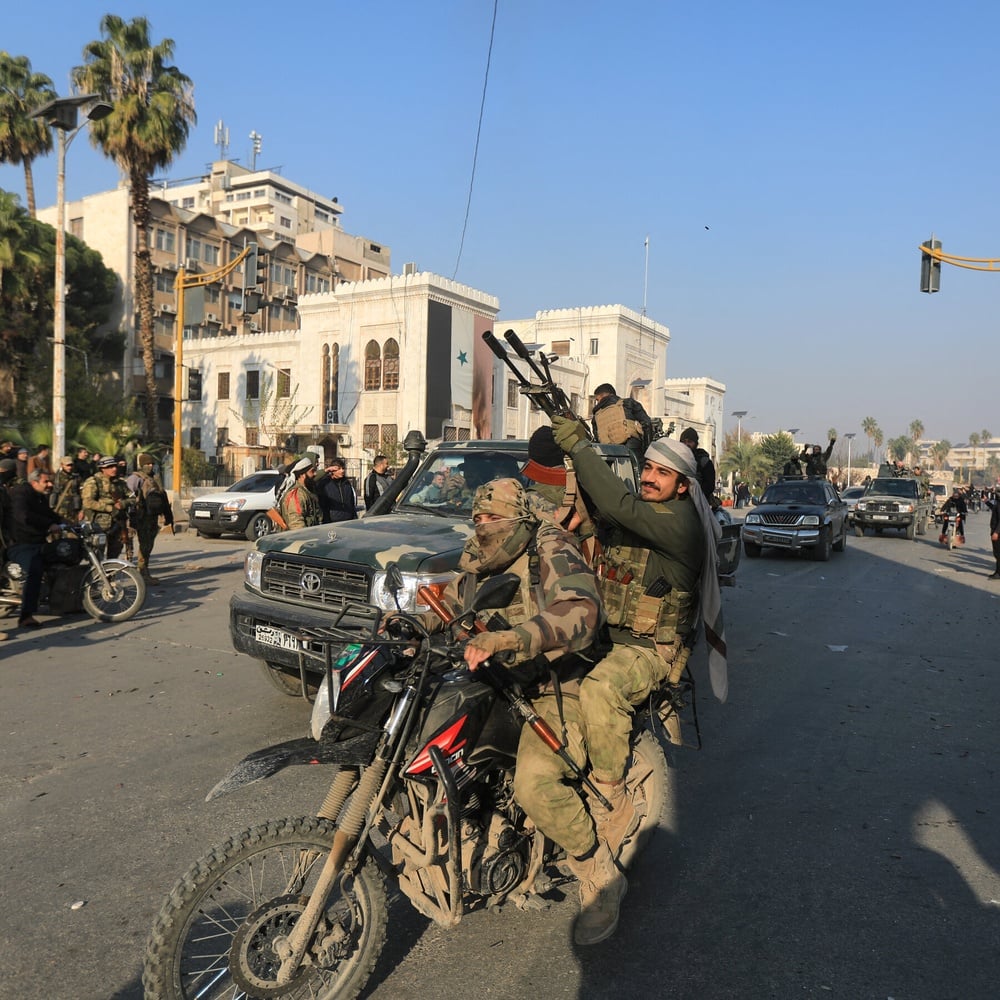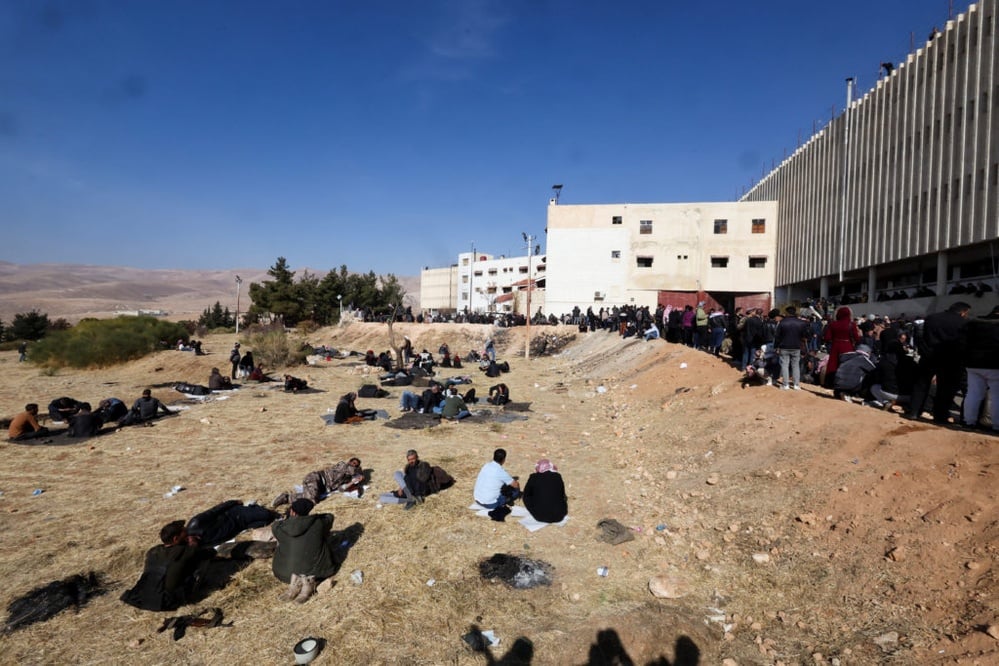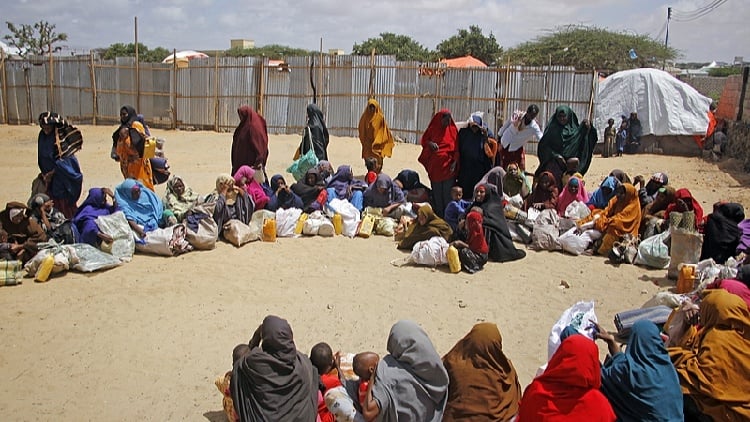
Article Bias: The article presents a dramatic account of the deteriorating situation in Syria, focusing on the rise of Islamic terrorist groups and the implications of their advances on regional stability, particularly for Israel, while portraying Assad's regime as increasingly weakened and in danger of collapse, which could elicit a particular moral perspective on the conflict.
Social Shares: 312
🔵 Liberal <-> Conservative 🔴:
🗽 Libertarian <-> Authoritarian 🚔:
🗞️ Objective <-> Subjective 👁️ :
🚨 Sensational:
📉 Bearish <-> Bullish 📈:
📝 Prescriptive:
🕊️ Dovish <-> Hawkish 🦁:
😨 Fearful:
📞 Begging the Question:
🗣️ Gossip:
💭 Opinion:
🗳 Political:
Oversimplification:
🏛️ Appeal to Authority:
🍼 Immature:
🔄 Circular Reasoning:
👀 Covering Responses:
😢 Victimization:
😤 Overconfident:
🗑️ Spam:
✊ Ideological:
🏴 Anti-establishment <-> Pro-establishment 📺:
🙁 Negative <-> Positive 🙂:
📏📏 Double Standard:
❌ Uncredible <-> Credible ✅:
🧠 Rational <-> Irrational 🤪:
🤑 Advertising:
🎲 Speculation:
🐍 Manipulative:
🤖 Written by AI:
💔 Low Integrity <-> High Integrity ❤️:
AI Bias: An AI perspective might lack nuanced understanding of geopolitical conflicts.
Article Bias: The article discusses the collapse of Bashar al-Assad's regime in Syria, portraying it as a positive development for the Syrian people and a shift in regional power dynamics, while also highlighting concerns about the rise of militant groups like Hayat Tahrir al-Sham and the implications for both Israel and Iran, suggesting a nuanced yet somewhat critical perspective on the roles of foreign powers involved in the Syrian conflict.
Social Shares: 52
🔵 Liberal <-> Conservative 🔴:
🗽 Libertarian <-> Authoritarian 🚔:
🗞️ Objective <-> Subjective 👁️ :
🚨 Sensational:
📉 Bearish <-> Bullish 📈:
📝 Prescriptive:
🕊️ Dovish <-> Hawkish 🦁:
😨 Fearful:
📞 Begging the Question:
🗣️ Gossip:
💭 Opinion:
🗳 Political:
Oversimplification:
🏛️ Appeal to Authority:
🍼 Immature:
🔄 Circular Reasoning:
👀 Covering Responses:
😢 Victimization:
😤 Overconfident:
🗑️ Spam:
✊ Ideological:
🏴 Anti-establishment <-> Pro-establishment 📺:
🙁 Negative <-> Positive 🙂:
📏📏 Double Standard:
❌ Uncredible <-> Credible ✅:
🧠 Rational <-> Irrational 🤪:
🤑 Advertising:
🤖 Written by AI:
💔 Low Integrity <-> High Integrity ❤️:
AI Bias: Neutral tone, but may have underlying influences from training data.
Article Bias: The article presents the complex dynamics of Syria post-Assad, highlighting both the euphoria of his overthrow and the looming challenges, revealing a bias that leans towards the implications of sectarian divisions, foreign interests, and the precarious future of the nation without a dictatorial regime.
Social Shares: 2
🔵 Liberal <-> Conservative 🔴:
🗽 Libertarian <-> Authoritarian 🚔:
🗞️ Objective <-> Subjective 👁️ :
🚨 Sensational:
📉 Bearish <-> Bullish 📈:
📝 Prescriptive:
🕊️ Dovish <-> Hawkish 🦁:
😨 Fearful:
📞 Begging the Question:
🗣️ Gossip:
💭 Opinion:
🗳 Political:
Oversimplification:
🏛️ Appeal to Authority:
🍼 Immature:
🔄 Circular Reasoning:
👀 Covering Responses:
😢 Victimization:
😤 Overconfident:
🗑️ Spam:
✊ Ideological:
🏴 Anti-establishment <-> Pro-establishment 📺:
🙁 Negative <-> Positive 🙂:
📏📏 Double Standard:
❌ Uncredible <-> Credible ✅:
🧠 Rational <-> Irrational 🤪:
🤑 Advertising:
👤 Individualist <-> Collectivist 👥:
🎲 Speculation:
🐍 Manipulative:
🤖 Written by AI:
💔 Low Integrity <-> High Integrity ❤️:
AI Bias: Limited by training data; strive for neutrality but may reflect tendencies.
Article Bias: The article reports on the significant political shift in Syria as President Assad fled amid rebel advances in a way that acknowledges both the celebration of rebels and the complexities of the new power dynamics while maintaining a generally neutral tone towards the events described.
Social Shares: 78
🔵 Liberal <-> Conservative 🔴:
🗽 Libertarian <-> Authoritarian 🚔:
🗞️ Objective <-> Subjective 👁️ :
🚨 Sensational:
📉 Bearish <-> Bullish 📈:
📝 Prescriptive:
🕊️ Dovish <-> Hawkish 🦁:
😨 Fearful:
📞 Begging the Question:
🗣️ Gossip:
💭 Opinion:
🗳 Political:
Oversimplification:
🏛️ Appeal to Authority:
🍼 Immature:
🔄 Circular Reasoning:
👀 Covering Responses:
😢 Victimization:
🗑️ Spam:
✊ Ideological:
🏴 Anti-establishment <-> Pro-establishment 📺:
🙁 Negative <-> Positive 🙂:
📏📏 Double Standard:
❌ Uncredible <-> Credible ✅:
🧠 Rational <-> Irrational 🤪:
🤑 Advertising:
🤖 Written by AI:
💔 Low Integrity <-> High Integrity ❤️:
AI Bias: Neutral analysis based on diverse perspectives and factual information.
Article Bias: The article discusses the collapse of Bashar al-Assad's regime in Syria, portraying it as a positive development for the Syrian people and a shift in regional power dynamics, while also highlighting concerns about the rise of militant groups like Hayat Tahrir al-Sham and the implications for both Israel and Iran, suggesting a nuanced yet somewhat critical perspective on the roles of foreign powers involved in the Syrian conflict.
Social Shares: 52
🔵 Liberal <-> Conservative 🔴:
🗽 Libertarian <-> Authoritarian 🚔:
🗞️ Objective <-> Subjective 👁️ :
🚨 Sensational:
📉 Bearish <-> Bullish 📈:
📝 Prescriptive:
🕊️ Dovish <-> Hawkish 🦁:
😨 Fearful:
📞 Begging the Question:
🗣️ Gossip:
💭 Opinion:
🗳 Political:
Oversimplification:
🏛️ Appeal to Authority:
🍼 Immature:
🔄 Circular Reasoning:
👀 Covering Responses:
😢 Victimization:
😤 Overconfident:
🗑️ Spam:
✊ Ideological:
🏴 Anti-establishment <-> Pro-establishment 📺:
🙁 Negative <-> Positive 🙂:
📏📏 Double Standard:
❌ Uncredible <-> Credible ✅:
🧠 Rational <-> Irrational 🤪:
🤑 Advertising:
🤖 Written by AI:
💔 Low Integrity <-> High Integrity ❤️:
AI Bias: Neutral tone, but may have underlying influences from training data.
Article Bias: The article presents a dramatic account of the deteriorating situation in Syria, focusing on the rise of Islamic terrorist groups and the implications of their advances on regional stability, particularly for Israel, while portraying Assad's regime as increasingly weakened and in danger of collapse, which could elicit a particular moral perspective on the conflict.
Social Shares: 312
🔵 Liberal <-> Conservative 🔴:
🗽 Libertarian <-> Authoritarian 🚔:
🗞️ Objective <-> Subjective 👁️ :
🚨 Sensational:
📉 Bearish <-> Bullish 📈:
📝 Prescriptive:
🕊️ Dovish <-> Hawkish 🦁:
😨 Fearful:
📞 Begging the Question:
🗣️ Gossip:
💭 Opinion:
🗳 Political:
Oversimplification:
🏛️ Appeal to Authority:
🍼 Immature:
🔄 Circular Reasoning:
👀 Covering Responses:
😢 Victimization:
😤 Overconfident:
🗑️ Spam:
✊ Ideological:
🏴 Anti-establishment <-> Pro-establishment 📺:
🙁 Negative <-> Positive 🙂:
📏📏 Double Standard:
❌ Uncredible <-> Credible ✅:
🧠 Rational <-> Irrational 🤪:
🤑 Advertising:
🎲 Speculation:
🐍 Manipulative:
🤖 Written by AI:
💔 Low Integrity <-> High Integrity ❤️:
AI Bias: An AI perspective might lack nuanced understanding of geopolitical conflicts.
Article Bias: The article discusses the collapse of Bashar al-Assad's regime in Syria, portraying it as a positive development for the Syrian people and a shift in regional power dynamics, while also highlighting concerns about the rise of militant groups like Hayat Tahrir al-Sham and the implications for both Israel and Iran, suggesting a nuanced yet somewhat critical perspective on the roles of foreign powers involved in the Syrian conflict.
Social Shares: 52
🔵 Liberal <-> Conservative 🔴:
🗽 Libertarian <-> Authoritarian 🚔:
🗞️ Objective <-> Subjective 👁️ :
🚨 Sensational:
📉 Bearish <-> Bullish 📈:
📝 Prescriptive:
🕊️ Dovish <-> Hawkish 🦁:
😨 Fearful:
📞 Begging the Question:
🗣️ Gossip:
💭 Opinion:
🗳 Political:
Oversimplification:
🏛️ Appeal to Authority:
🍼 Immature:
🔄 Circular Reasoning:
👀 Covering Responses:
😢 Victimization:
😤 Overconfident:
🗑️ Spam:
✊ Ideological:
🏴 Anti-establishment <-> Pro-establishment 📺:
🙁 Negative <-> Positive 🙂:
📏📏 Double Standard:
❌ Uncredible <-> Credible ✅:
🧠 Rational <-> Irrational 🤪:
🤑 Advertising:
🤖 Written by AI:
💔 Low Integrity <-> High Integrity ❤️:
AI Bias: Neutral tone, but may have underlying influences from training data.
Article Bias: The article presents the complex dynamics of Syria post-Assad, highlighting both the euphoria of his overthrow and the looming challenges, revealing a bias that leans towards the implications of sectarian divisions, foreign interests, and the precarious future of the nation without a dictatorial regime.
Social Shares: 2
🔵 Liberal <-> Conservative 🔴:
🗽 Libertarian <-> Authoritarian 🚔:
🗞️ Objective <-> Subjective 👁️ :
🚨 Sensational:
📉 Bearish <-> Bullish 📈:
📝 Prescriptive:
🕊️ Dovish <-> Hawkish 🦁:
😨 Fearful:
📞 Begging the Question:
🗣️ Gossip:
💭 Opinion:
🗳 Political:
Oversimplification:
🏛️ Appeal to Authority:
🍼 Immature:
🔄 Circular Reasoning:
👀 Covering Responses:
😢 Victimization:
😤 Overconfident:
🗑️ Spam:
✊ Ideological:
🏴 Anti-establishment <-> Pro-establishment 📺:
🙁 Negative <-> Positive 🙂:
📏📏 Double Standard:
❌ Uncredible <-> Credible ✅:
🧠 Rational <-> Irrational 🤪:
🤑 Advertising:
👤 Individualist <-> Collectivist 👥:
🎲 Speculation:
🐍 Manipulative:
🤖 Written by AI:
💔 Low Integrity <-> High Integrity ❤️:
AI Bias: Limited by training data; strive for neutrality but may reflect tendencies.
Article Bias: The article discusses the collapse of Bashar al-Assad's regime in Syria, portraying it as a positive development for the Syrian people and a shift in regional power dynamics, while also highlighting concerns about the rise of militant groups like Hayat Tahrir al-Sham and the implications for both Israel and Iran, suggesting a nuanced yet somewhat critical perspective on the roles of foreign powers involved in the Syrian conflict.
Social Shares: 52
🔵 Liberal <-> Conservative 🔴:
🗽 Libertarian <-> Authoritarian 🚔:
🗞️ Objective <-> Subjective 👁️ :
🚨 Sensational:
📉 Bearish <-> Bullish 📈:
📝 Prescriptive:
🕊️ Dovish <-> Hawkish 🦁:
😨 Fearful:
📞 Begging the Question:
🗣️ Gossip:
💭 Opinion:
🗳 Political:
Oversimplification:
🏛️ Appeal to Authority:
🍼 Immature:
🔄 Circular Reasoning:
👀 Covering Responses:
😢 Victimization:
😤 Overconfident:
🗑️ Spam:
✊ Ideological:
🏴 Anti-establishment <-> Pro-establishment 📺:
🙁 Negative <-> Positive 🙂:
📏📏 Double Standard:
❌ Uncredible <-> Credible ✅:
🧠 Rational <-> Irrational 🤪:
🤑 Advertising:
🤖 Written by AI:
💔 Low Integrity <-> High Integrity ❤️:
AI Bias: Neutral tone, but may have underlying influences from training data.
Rebel Groups
International Community
Assad Supporters
My Bias
Story Blindspots
Article Bias: The article presents a dramatic account of the deteriorating situation in Syria, focusing on the rise of Islamic terrorist groups and the implications of their advances on regional stability, particularly for Israel, while portraying Assad's regime as increasingly weakened and in danger of collapse, which could elicit a particular moral perspective on the conflict.
Social Shares: 312
🔵 Liberal <-> Conservative 🔴:
🗽 Libertarian <-> Authoritarian 🚔:
🗞️ Objective <-> Subjective 👁️ :
🚨 Sensational:
📉 Bearish <-> Bullish 📈:
📝 Prescriptive:
🕊️ Dovish <-> Hawkish 🦁:
😨 Fearful:
📞 Begging the Question:
🗣️ Gossip:
💭 Opinion:
🗳 Political:
Oversimplification:
🏛️ Appeal to Authority:
🍼 Immature:
🔄 Circular Reasoning:
👀 Covering Responses:
😢 Victimization:
😤 Overconfident:
🗑️ Spam:
✊ Ideological:
🏴 Anti-establishment <-> Pro-establishment 📺:
🙁 Negative <-> Positive 🙂:
📏📏 Double Standard:
❌ Uncredible <-> Credible ✅:
🧠 Rational <-> Irrational 🤪:
🤑 Advertising:
🎲 Speculation:
🐍 Manipulative:
🤖 Written by AI:
💔 Low Integrity <-> High Integrity ❤️:
AI Bias: An AI perspective might lack nuanced understanding of geopolitical conflicts.
Article Bias: The article presents the complex dynamics of Syria post-Assad, highlighting both the euphoria of his overthrow and the looming challenges, revealing a bias that leans towards the implications of sectarian divisions, foreign interests, and the precarious future of the nation without a dictatorial regime.
Social Shares: 2
🔵 Liberal <-> Conservative 🔴:
🗽 Libertarian <-> Authoritarian 🚔:
🗞️ Objective <-> Subjective 👁️ :
🚨 Sensational:
📉 Bearish <-> Bullish 📈:
📝 Prescriptive:
🕊️ Dovish <-> Hawkish 🦁:
😨 Fearful:
📞 Begging the Question:
🗣️ Gossip:
💭 Opinion:
🗳 Political:
Oversimplification:
🏛️ Appeal to Authority:
🍼 Immature:
🔄 Circular Reasoning:
👀 Covering Responses:
😢 Victimization:
😤 Overconfident:
🗑️ Spam:
✊ Ideological:
🏴 Anti-establishment <-> Pro-establishment 📺:
🙁 Negative <-> Positive 🙂:
📏📏 Double Standard:
❌ Uncredible <-> Credible ✅:
🧠 Rational <-> Irrational 🤪:
🤑 Advertising:
👤 Individualist <-> Collectivist 👥:
🎲 Speculation:
🐍 Manipulative:
🤖 Written by AI:
💔 Low Integrity <-> High Integrity ❤️:
AI Bias: Limited by training data; strive for neutrality but may reflect tendencies.
Article Bias: The article discusses the collapse of Bashar al-Assad's regime in Syria, portraying it as a positive development for the Syrian people and a shift in regional power dynamics, while also highlighting concerns about the rise of militant groups like Hayat Tahrir al-Sham and the implications for both Israel and Iran, suggesting a nuanced yet somewhat critical perspective on the roles of foreign powers involved in the Syrian conflict.
Social Shares: 52
🔵 Liberal <-> Conservative 🔴:
🗽 Libertarian <-> Authoritarian 🚔:
🗞️ Objective <-> Subjective 👁️ :
🚨 Sensational:
📉 Bearish <-> Bullish 📈:
📝 Prescriptive:
🕊️ Dovish <-> Hawkish 🦁:
😨 Fearful:
📞 Begging the Question:
🗣️ Gossip:
💭 Opinion:
🗳 Political:
Oversimplification:
🏛️ Appeal to Authority:
🍼 Immature:
🔄 Circular Reasoning:
👀 Covering Responses:
😢 Victimization:
😤 Overconfident:
🗑️ Spam:
✊ Ideological:
🏴 Anti-establishment <-> Pro-establishment 📺:
🙁 Negative <-> Positive 🙂:
📏📏 Double Standard:
❌ Uncredible <-> Credible ✅:
🧠 Rational <-> Irrational 🤪:
🤑 Advertising:
🤖 Written by AI:
💔 Low Integrity <-> High Integrity ❤️:
AI Bias: Neutral tone, but may have underlying influences from training data.


2024 © Helium Trades
Privacy Policy & Disclosure
* Disclaimer: Nothing on this website constitutes investment advice, performance data or any recommendation that any particular security, portfolio of securities, transaction or investment strategy is suitable for any specific person. Helium Trades is not responsible in any way for the accuracy
of any model predictions or price data. Any mention of a particular security and related prediction data is not a recommendation to buy or sell that security. Investments in securities involve the risk of loss. Past performance is no guarantee of future results. Helium Trades is not responsible for any of your investment decisions,
you should consult a financial expert before engaging in any transaction.
![]() Ask any question about this page!
Ask any question about this page!